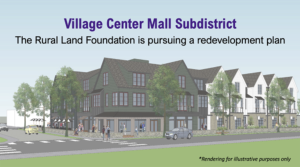
An illustration of what the mall building might look like if the area was rezoned to allow 25 units of housing per acre. This sketch shows a denser massing of 42 units per acre at the front of the subdistrict, which would be balanced by a lower concentration of housing in the rest. Donelan’s is in white at left rear.
Rezoning to comply with the Housing Choice Act may some day result in more multifamily housing in South Lincoln and perhaps other areas, if developers are interested — but change is probably coming much sooner to the mall. Civico, which designed and built Oriole Landing, is poised to redevelop the mall’s main building with more commercial space and housing — assuming a separate rezoning proposal is approved by voters.
In the second of two public forums on June 20, consultants recapped their June 6 presentation about rezoning options to comply with the HCA. The law will require Lincoln to allow at least 15 housing units per acre (for a total capacity of 635 units) on parcels of land totaling at least 42 acres, 20% of which must be within half a mile of the train station — click here to see the updated slide deck.
Running alongside the HCA work is a separate effort to rezone just the mall area with the goal of encouraging more commercial use while also adding housing above stores in the main building (the post office and restaurant buildings would not be affected). One of the HCA’s stipulations is that commercial use can’t be required in the rezoned areas, but the Rural Land Foundation (owners of the mall) and Civico are proposing a new subdistrict that would pave the way for a mixed-use buildout by right with improved commercial space and 25 multifamily housing units per acre. The subdistrict would include the commuter lot on the east side of the railroad tracks.
“We need to think holistically about this area,” Select Board Jennifer Glass said. “These two kind of work together — two ideas with one zoning package.” The two proposals — a preferred rezoning option selected from five viable HCA concepts, and the mall subdistrict — will be presented at the State of the Town meeting on September 30 and submitted to votes at Town Meeting in March 2024.
“Without a mall subdistrict, it’s highly unlikely we’ll be able to revitalize the mall in keeping with Lincoln’s values and rural character,” said Michelle Barnes, chair of the Lincoln Land Conservation Trust/RLF Board of Trustees. This effort would go beyond the HCA moves (which simply allow denser housing but do not require anyone to build them) because the RLF already has a development partner and a preliminary sketch of a project.
Civico, a developer that is “known to and trusted by the town,” went through the arduous Town Meeting approval process for Oriole Landing but has indicated that “they would not be willing to do so again,” Barnes said.
The mall project would actually allow Lincoln to respond more quickly to the area-wide housing crisis and the state’s push for more transit-oriented housing, she added. If all goes as planned, Civico and the town (which does not have the resources to redevelop the mall on its own) would collaborate on a project in keeping with the town’s character, with the sale of the mall contingent on such a design.
One stumbling block to redevelopment is the age and limited capacity of the wastewater treatment plant that services both the mall and Lincoln Woods. The plant is owned by TCB (The Community Builders, Inc.). Paula Vaughn-MacKenzie, Director of Planning and Land Use, said that the RLF is working with TCB on a plan for upgrading the plant, but the financial details are still unknown. However, the town already received $400,000 from the state in late 2021 to design an upgrade.
TCB and Civico are “both more than confident that they would be able to get a Massworks grant for the mall project as long as the town complies with the HCA,” Barnes said.
Massworks grants are often in the millions and could pay for more than half of the project, Vaughn-MacKenzie said. Even if the HCA weren’t in the picture, “the state would be thrilled [with the mall project]. It’s just the type of project they’d want to support,” Vaughn-MacKenzie said.
Town rezoning approval for a mall project funded by Civico and the state would be a big plus for Lincoln, which would broaden its tax base as well as improve housing and commercial options there, said Planning Board member Gary Taylor. “Right now everything seems to be aligned in trying to make this happen.”
Lexington is the first town to approve rezoning to comply with the HCA while also encouraging improved commercial use. The measure was the subject of articles in the Boston Globe and the New Yorker.
An important caveat-it must be noted that the “ requirement “ for rezoning is ONLY a requirement in order to get to the head of the line for certain state grants.
It is not guaranteed that we would get those grants, even if we rezone.
We need to be clear as to what the trade-offs are and what is truly at stake before we act.